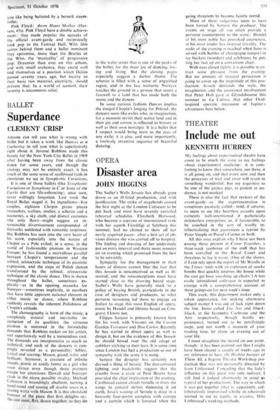OPERA
Disaster area
JOHN HIGGINS
The Sadler's Wells Semele has already gone down as an ill-fated production, and with justification. The strike of stagehands caused the first night at the London Coliseum to be put back and must have severely curtailed rehearsal schedules. Elizabeth Harwood, who became a soprano of international rank with her superb Fiordiligi at Salzburg this summer, had no chance to show off her newly acquired paces: after a first act of ob- vious distress she was carried off to hospital. The finding and dressing of her understudy put an extra interval and thirty more minutes on an evening which promised from the first to be unwieldy.
Sympathy for the management in their hours of distress cannot blur the fact that this Semele is -misconceived as well as ill- starred, and the misconceptions must have started close to the drawing board stage. Sadler's Wells have generally stuck to a policy of buying British, particularly in the case of designers and producers, so what perverse reasoning led them to engage an Italian to stage this most English of opera, music by Handel and libretto based on Con- greve, I know not.
Filippo Sanjust is primarily known here for his work with Visconti on the Covent Garden Trovatore and Don Carlos. Recently he has started to direct, opera as well as design it, but on the evidence of this Semele he should brood over the old adage of cobblers sticking to their lasts. It is some time since London has had a production so out of sympathy with the score it is using.
Sanjust the designer has certainly not devised a thing of beauty. The dun-coloured lighting and backcloths suggest that the crumbs from a crate of Petit Beurre have provided the chief inspiration of the evening. Cardboard cutout clouds trundle in from the wings to conceal deities, slumming it on earth, Jove's wooing of Semele is done in a heavenly four-poster complete with canopy and a curtain which is lowered when the
going threatens to become faintly torrid.
Most of these vulgarities seem to have been forced by Sanjust the producer. The events on stage all too often provide a perverse counterpoint to the score: Handel at his most noble has provoked coarseness, at his most tender has inspired frivolity. The nadir of the evening is reached when Juno is served with bottles of champagne (empty) in ice buckets (wooden) and celebrates by put- ting her feet up on a convenient chair.
With eyes closed tightly it is possible to ex- tract some pleasure from the evening. But no amount of musical persuasion is going to cover up the ineptitude of this pro- duction. Semele demands the style, the imagination and the emotional involvement that Peter Hall gave at Glyndebourne this summer to La Calisto. that other Ovid- inspired operatic treatment of Jupiter's adventures here below.










































 Previous page
Previous page